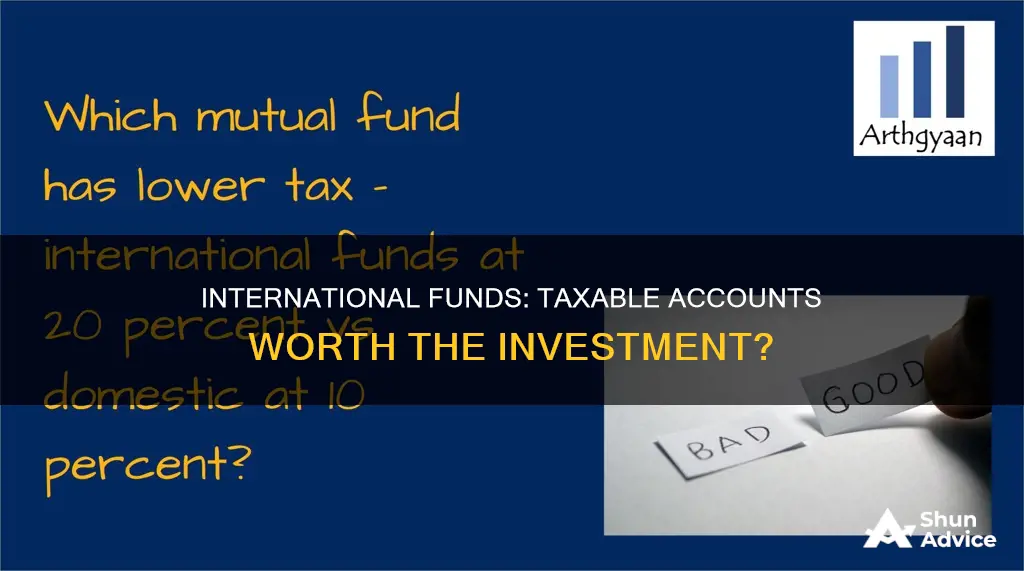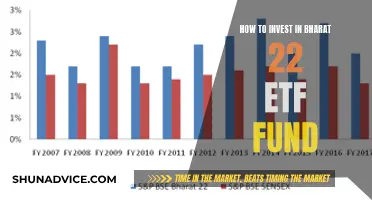
Investing in international funds in a taxable account is a highly debated topic. Some investors argue that international funds should be purchased in taxable accounts to take advantage of the foreign tax credit. However, others argue that the higher dividends of international funds, which are taxed at a higher rate, outweigh the benefits of the foreign tax credit. Ultimately, the decision of where to invest in international funds depends on various factors, including an investor's tax bracket, the specific international fund, and the investor's overall asset allocation strategy.
| Characteristics | Values |
|---|---|
| Tax efficiency | Tax-efficient |
| Foreign tax credit | Eligible |
| Dividend distribution | Higher |
| Tax-deferred accounts | Tax-advantaged |
| Taxable accounts | Taxable |
What You'll Learn

International funds are eligible for the foreign tax credit
Firstly, it's important to understand the concept of tax-efficient fund placement. This refers to the decision of where to hold different types of investments, such as international funds, in either taxable or tax-advantaged accounts, to minimize taxes. The tax code recognizes different sources of investment income, each taxed at different rates. For example, total market stock index funds are considered tax-efficient because they produce low dividends, whereas bond funds are tax-inefficient due to the high taxes on the interest they generate.
Now, when it comes to international funds, they often have higher dividend yields compared to US funds, which can result in higher taxes. However, international funds offer a unique advantage—eligibility for the foreign tax credit. This credit helps offset the taxes paid to a foreign country on dividend income, ensuring you don't pay taxes twice on the same income.
To claim the foreign tax credit, you would typically file Form 1116 in the US. There are specific requirements and calculations to determine eligibility and the amount of credit you can claim. For example, the credit only applies to certain types of taxes, like income, war profits, and excess profits taxes. Additionally, the credit is usually more advantageous than claiming a deduction for foreign taxes paid.
It's worth noting that holding international funds in a tax-advantaged account, like an IRA, can be less beneficial due to the way taxes are handled in these accounts. In an IRA, you don't pay taxes on a year-by-year basis, and you can't take advantage of the foreign tax credit for dividends received and taxes paid to a foreign country. As a result, the tax benefits of an IRA don't fully compensate for the lost opportunity of claiming the foreign tax credit.
However, the decision to hold international funds in a taxable or tax-advantaged account depends on various factors. These include your tax bracket, state tax laws, the availability of similar US and international funds across account types, and the expected performance of the funds. It's essential to consider your specific circumstances and consult a tax professional before making investment decisions.
A Guide to Investing in SBI Mutual Fund SIPs
You may want to see also

International funds have higher dividend distribution
Foreign tax credit
International funds are eligible for the foreign tax credit, which can be used to offset the US tax cost. However, this credit does not apply if the international funds are held in a tax-advantaged account. Therefore, there is a small tax advantage to holding international funds in a taxable account.
State tax
In high-tax states that do not allow a foreign tax credit on state tax, it is better to hold US stocks in a taxable account and international stocks in a tax-advantaged account. This is because the higher dividends on international stocks will be taxed at the high state tax rate.
Tax-efficiency
The tax-efficiency of international funds depends on the dividend yield and the proportion of qualified dividends. In recent years, foreign dividend yields have been higher than US dividend yields. Additionally, foreign stocks tend to have more non-qualified dividends. Therefore, international funds can be less tax-efficient than US funds, especially for investors in high tax brackets.
Performance
While international funds have higher dividend distribution, their performance has lagged behind US funds over the past decade. This underperformance has given international stocks a valuation advantage, and they are expected to outperform the US market in the next decade.
Overall considerations
While international funds have higher dividend distribution, there are other factors to consider when deciding whether to invest in a taxable or tax-advantaged account. These include the performance of the funds, the tax treatment of dividends, and the long-term tax-saving features of tax-advantaged accounts. Ultimately, the decision depends on an investor's individual circumstances and tax situation.
Hedge Fund Memos: Where to Access and Read
You may want to see also

International funds are more tax-efficient
International funds tend to have higher dividend yields than their US counterparts, which can result in higher taxes. Additionally, a smaller proportion of the dividends from international funds may be qualified, further increasing the tax burden. For investors in high tax brackets, the tax advantages of holding international funds in taxable accounts may be outweighed by the higher dividend yields and lower proportion of qualified dividends.
Another factor to consider is the volatility of international funds, which can provide opportunities for tax loss harvesting in taxable accounts. Tax loss harvesting involves selling an asset with a capital loss and purchasing a similar but not identical asset, allowing investors to offset realised capital gains and reduce their tax liability. The higher volatility of international funds can provide more opportunities for tax loss harvesting, making them more attractive for taxable accounts.
Overall, the tax efficiency of international funds depends on various factors, including dividend yields, the percentage of qualified dividends, the investor's marginal tax bracket, and the potential for tax loss harvesting. While international funds offer the benefit of the foreign tax credit, this may be offset by higher dividend yields and a lower proportion of qualified dividends. Therefore, investors should carefully consider their specific situation before deciding whether to hold international funds in taxable or tax-advantaged accounts.
Thailand's Climate Investment Funds: A Historical Overview
You may want to see also

International funds are more volatile
In the March of 2020, I was able to tax-loss harvest with my admittedly tax-inefficient emerging market allocation in my Vanguard taxable brokerage account. For a complete guide on how to do this, please see my guides for TLH at Vanguard and TLH at Fidelity.
For example, when the markets were tanking in early 2020, I sold VEMAX shares on March 3rd and 9th, buying shares of IEMG (iShares Core MSCI Emerging Markets ETF) with the proceeds. I “banked” just over $5,000 in paper losses with these moves.
As the market continued to plummet, I sold the IEMG shares to buy SPEM (SPDR Portfolio Emerging Markets ETF). This resulted in an additional $17,125 in paper losses.
In three weeks, with this volatile asset class in a very volatile time, I have enough capital losses to deduct $3,000 against ordinary income for 7+ years. That can easily lead to $7,000 to $10,000 in tax savings over a 7-year timeframe.
Note that I remained invested in that asset class, so I didn’t lock in actual losses by selling and staying out of the market. As you probably know, the stock market rebounded nicely, and this is why my SPEM balance looks like six months after the transactions above.
The $127,530 worth of VEMAX is now $175,279 worth of SPEM as of August 2021, and I reported $22,175 in capital losses for 2020 in this asset class.
It’s true that most equities took a deep dive in that timeframe (I harvested a total of about $170,000 paper losses that month), but emerging markets are historically among the more volatile asset classes.
Angel Broking: Your Mutual Fund Investment Guide
You may want to see also

International funds are less tax-efficient for high-income earners
The tax efficiency of international funds depends on several factors, including the percentage of the fund's foreign source income, the foreign tax rate, the percentage of foreign dividends that are qualified, and the investor's marginal tax bracket. For high-income earners, the tax drag from the higher dividend payouts of international funds can outweigh the benefit of the foreign tax credit.
In addition, international funds tend to have a higher proportion of non-qualified dividends, which are taxed at a higher rate than qualified dividends. This further reduces the tax efficiency of international funds for high-income earners.
Therefore, for high-income earners, it may be more advantageous to hold international funds in tax-advantaged accounts, such as a traditional IRA or 401(k), rather than in a taxable brokerage account. This allows investors to take advantage of the tax-deferred or tax-free growth offered by these accounts, which can help make up for the higher taxes paid on dividends from international funds.
However, there are other factors to consider when deciding where to hold international funds. International funds tend to be more volatile, providing more opportunities for tax-loss harvesting in a taxable account. Additionally, international funds may offer higher cash flow due to their higher dividend payouts, which may be beneficial for investors seeking income.
Ultimately, the decision of where to hold international funds depends on an investor's individual circumstances, including their tax bracket, investment goals, and risk tolerance.
Bond Index Funds: A Guide to Investing
You may want to see also
Frequently asked questions
It depends on your tax bracket and the type of international fund. If you are in a high tax bracket, it may be better to hold international funds in a tax-advantaged account. However, if you have a low taxable income, there is a slight advantage to holding international funds in a taxable account.
The foreign tax credit is a dollar-for-dollar reduction in taxes that US-based investors can claim when investing in international funds. The credit is only available when the international fund is held in a taxable account.
Tax-advantaged accounts include traditional IRAs, 401(k)s, and Roth IRAs. These accounts offer tax-free growth, meaning you pay no taxes on dividend payments and owe no taxes on capital gains as long as the proceeds remain in the account.







